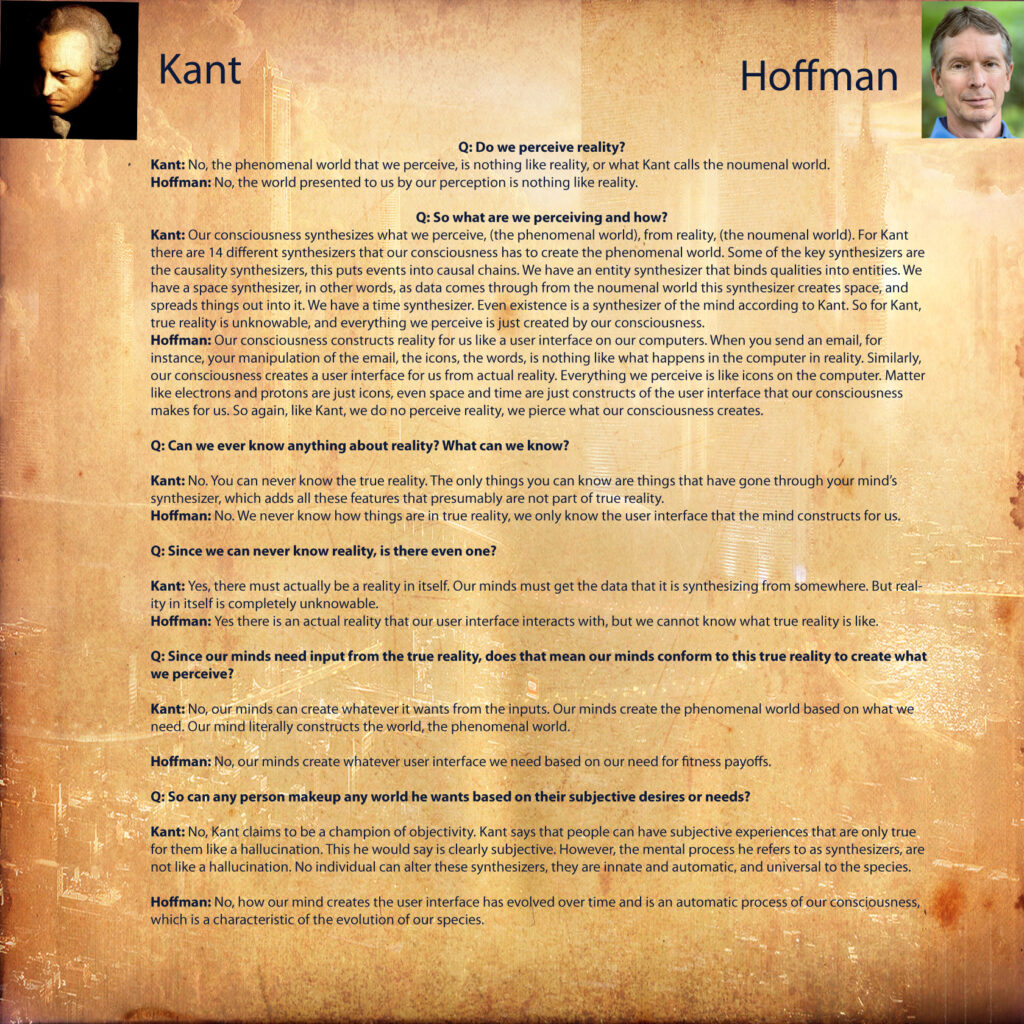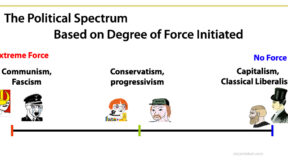Though it may sound as though Donald Hoffman’s theory called the interface theory of perception is a novel idea, it is not, it was invented by Kant in the 18th century. Hoffman does manage to put a new modern spin on this theory. However, it still reads as a word-for-word recitation of Kant.
I am going to go through some questions Kant claimed to answer, and see how Hoffman’s interface theory of perceptions matches up.
Q: Do we perceive reality?
Kant: No, the phenomenal world that we perceive, is nothing like reality, or what Kant calls the noumenal world.
Hoffman: No, the world presented to us by our perception is nothing like reality.
Q: So what are we perceiving and how?
Kant: Our consciousness synthesizes what we perceive, (the phenomenal world), from reality, (the noumenal world). For Kant there are 14 different synthesizers that our consciousness has to create the phenomenal world. Some of the key synthesizers are the causality synthesizer, this puts events into causal chains. We have an entity synthesizer that binds qualities into entities. We have a space synthesizer, in other words, as data comes through from the noumenal world this synthesizer creates space, and spreads things out into it. We have a time synthesizer. Even existence is a synthesizer of the mind according to Kant. So for Kant, true reality is unknowable, and everything we perceive is just created by our consciousness.
Hoffman: Our consciousness constructs reality for us like a user interface on our computers. When you send an email, for instance, your manipulation of the email, the icons, the words, is nothing like what actually happens in the computer. You would never be able to figure out from what you see on the user interface that in reality, the computer is switching on and off millions of transistors. Similarly, our consciousness creates a user interface for us from actual reality. Everything we perceive is like icons on the computer. Matter like electrons and protons are just icons, even space and time are just constructs of the user interface that our consciousness makes for us. So again, like Kant, we do no perceive reality, we pierce what our consciousness creates.
Even from just two questions, you may be getting the picture now. These theories are sounding eerily similar. Both claim, that all the fundamental features and laws of the world that we experience, are actually contributions of the structures of our minds. Space, time, matter, causality, entities, all of that is a mental contribution.
Q: Can we ever know anything about reality? What can we know?
Kant: No. You can never know the true reality. The only things you can know are things that have gone through your mind’s synthesizer, which adds all these features that presumably are not part of true reality.
Hoffman: No. We never know how things are in true reality, we only know the user interface that the mind constructs for us.
Q: Since we can never know reality, is there even one?
Kant: Yes, there must actually be a reality in itself. Our minds must get the data that it is synthesizing from somewhere. But reality in itself is completely unknowable.
Hoffman: Yes there is an actual reality that our user interface interacts with, but we cannot know what true reality is like.
Q: Since our minds need input from the true reality, does that mean our minds conform to this true reality to create what we perceive?
Kant: No, our mind can create whatever it wants from the inputs. Our mind create the phenomenal world based on what we need. Our mind literally constructs the world, the phenomenal world.
Hoffman: No, our minds create whatever user interface we need based on our need for fitness payoffs.
Q: So can any person make up, any world he wants based on their subjective desires or needs?
Kant: No, Kant claims to be a champion of objectivity. Kant says that people can have subjective experiences that are only true for them like a hallucination. This he would say is clearly subjective. However, the mental process he refers to as synthesizers, are not like a hallucination. No individual can alter these synthesizers, they are innate and automatic, and universal to the species.
Hoffman: No, how our mind creates the user interface has evolved over time and is an automatic process of our consciousness, which is a characteristic of the evolution of our species.
Hoffman seems to just be reiterating Kant. To Hoffman’s credit, he does put a modern spin on why he thinks we do not perceive reality as it truly is. Discussing Kant’s reasoning for this, why he believes there is a true reality, a noumenal world, and the reality we perceive, the phenomenal world, I think is beyond this article, but I will briefly mention Hoffman’s reasons.
Hoffman argues that according to his experiments on natural selection or evolution, which by the way are completely absent from his book. This leads me to believe that there actually may be no such experiments, and he is simply seeking attention, but I digress. Hoffman claims that according to his experiments or natural selection simulations, the entities that perceive just the fitness payoffs directly always win out over entities that perceive true reality. What is a fitness payoff you may wonder? Well, it is simply something that will help the entity prolong its life. This may be acquiring some type of nutrients or this may be avoiding a predator, or even getting some extra rest. It is any type of something that increases the entity’s fitness to continue to live.
Since the entities that perceive fitness directly always win, Hoffman believes that over billions of years our consciousness must have evolved to perceive only fitness and not true reality. What does perceiving fitness mean? Well anything really, the mind can construct the world for us anyway it likes in order to help us attain fitness, and it doesn’t have to be anything like the true reality. Maybe we are some sort of 2-dimensional beings in the true reality that need to make multiple sophisticated calculations to attain some fitness, but our mind constructs us a world where we just have to water a plant that will eventually bear fruit. I mean it literally could be anything. He uses the computer user interface as an example. Hoffman says that if we had to manipulate all the circuits in the computer manually in order to write an email, we would never write one such email. However, using the user interface on our computers, we are able to write tens of emails fairly easily.
Now there is a lot of problems with this theory, and I don’t really want to go into them because the purpose of this article was to highlight Hoffman’s apparent lifting of Kant’s ideas. However, I can’t resist not to at least mention the main one, which as you will see, is really all you need. If Hoffman is right, and all of this is just our mental construct and has no relation to true reality, then all his experiments are utterly worthless. After all, the entities in his experiments are just mental constructs of his mind or icons as he calls them. All the rules the entities are playing by, even evolution and natural selection themselves are just a construct of his own conscious and have no bearing on true reality. And yet he claims that his experiments in what Kant would call the phenomenal world, tell him how things work in the true reality or the noumenal world. Now, this is not very Kantian of him, at least Kant didn’t contradict his own theories. Kant was actually very consistent on this point, no experiments in the phenomenal world can tell you anything about the noumenal world.






6 Comments
Sebastian Lundh
(April 28, 2022 - 6:53 pm)“If Hoffman is right, and all of this is just our mental construct and has no relation to true reality, then all his experiments are utterly worthless.”
Oh, gee! I wonder if you’re gonna explain why in a satisfactory way.
“After all, the entities in his experiments are just mental constructs of his mind or icons as he calls them. All the rules the entities are playing by, even evolution and natural selection themselves are just a construct of his own conscious and have no bearing on true reality. And yet he claims that his experiments in what Kant would call the phenomenal world, tell him how things work in the true reality or the noumenal world.”
When did he say the RULES, EVOLUTION, and NATURAL SELECTION are just construct?
admin
(April 28, 2022 - 9:14 pm)Hoffman says in his book that the world presented to us is nothing like reality, that we can know nothing about reality, that all we see is what the user face of our mind constructs for us. This explicitly means that everything, the rules, evolution, natural selection, gravity, time, everything is a mental construct. The disappointing thing about his book though is that he never goes into the experiments or the research that he is actually doing. He just proposes this idea that everything is a mental construct, but he bases it on evolution and natural selection, which by his own argument should only be a mental construct as well.
Sebastian Lundh
(April 29, 2022 - 4:39 am)Well, he says that we don’t perceive reality for what it literally is, but that doesn’t mean evolution isn’t true according to this way of thinking. It just means evolution doesn’t apply to physical objects in space time; the physical objects are just icons in our perceptual field, representing things in the real world.
You should be able to quote one passage where he makes it perfectly clear it should apply to more than just perceptions.
admin
(April 29, 2022 - 6:23 am)He doesn’t say it applies to more than just perception. However, what we see, what we perceive is all the information that we have. So when you are studying evolution and natural selection, you are studying an animal that is changing over time. Animals, and everything you perceive are just icons remember? So he would have to be studying icons when studying the evolution of animals.
Sebastian Lundh
(May 8, 2022 - 5:35 pm)Yes, when you’re studying evolution, you’re studying change in populations of animals over time, sure, but that doesn’t mean our perceptions of them are anything but icons in our mental sphere, and it certainly doesn’t mean these perceptions correspond to a identical, material thing beyond perceptions.
lester
(May 31, 2022 - 10:34 am)I cant see that there is anything new here. just a repeat of Kant ? can anybody suggest if I got this wrong. what I should look at. thanks